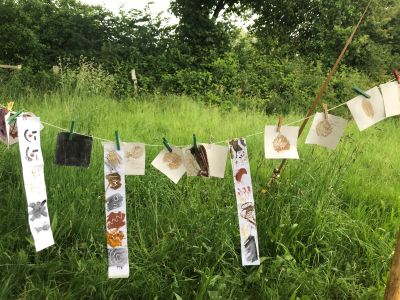Case Study: Celf Wyllt
Authors(s), Creator(s) and Contributors: Deri Morgan, Youth Projects Manager, Small World Theatre
Publication Date: 06/08/2025
Categories: Case Studies
Partner(s): Small World Theatre (SWT), Ffynnon Community Resilience (Ffynnon), Child and Adolescent Mental Health Service (CAMHS)
Funder(s): Arts Council Wales, Awards for All
Introduction
Celf Wyllt was a pilot partnership project by Small World Theatre, Ffynnon and CAMHS that combined creative arts, emotional regulation techniques and nature connection to improve mental health and well-being in young people aged 14 - 16. Building on the expertise of SWT's Amethyst project, a specialist team of facilitators and artists supported a group of young people referred to the project to creatively connect to nature. The sessions were held at the Field of Beans site over six weeks in late Spring 2025 and the group learned to use arts in nature as a tool for emotional regulation. They built a sense of belonging and connection to the self through nature and art using all of the senses and elements. This was the beginning of a new partnership which will continue.
The Challenge
Celf Wyllt was a concept conceived to address the mental health crisis among young people in our area. According to the Welsh Index of Multiple Depravation, Cardigan has the two wards that rank poorest in Ceredigion for income and employment. This, alongside rural isolation, limited resources and the legacy of the pandemic has left too many young people in West Wales struggling with their mental health, taking the form of anxiety, low mood, low self esteem, self harm and low motivation. As partners we recognised our abundant countryside as a freely accessible asset and wanted to see if enabling young people to connect to this would improve mental health. The project aimed to introduce our participants to the possibilities of using nature connection and the arts to self regulate.
The Approach
We initiated the project with partnership planning meetings, where we built relationships and designed the content of the workshops. In April we held a reconnaissance session at our planned site with professionals from all 3 partner organisations. We trialled activities and gathered feedback from which further informed our methodology. Over 6 weeks in May and June we delivered 6 days (12 sessions) of arts and nature activities at Field of Beans, one of Ffynnon’s sites in North Pembrokeshire. Amethyst and Ffynnon facilitators worked with local artists Florence Jackson and Seren Stacey to create a safe, well-boundaried environment for our 7 young participants who had been referred to us by parents/guardians and statutory and 3rd sector organisations. Activities included making and using art materials from nature, drawing shadows from nature, eco printing, nature mandalas and making shadow puppets and performing with them. We also cooked together over an open fire, which was an important element for the group. The weather varied from very sunny and hot to quite windy and rainy, however the participants turned up and took part even in the less pleasant weather.
The Impact
Celf Wyllt had evaluation built into its design and delivery. We developed an evaluation framework to explore the process of design and delivery, the impact on participants and the effectiveness of the partnership. We captured this using reflective discussions and evaluation meetings between facilitators and project partners. We also had open discussions with participants and the designed an Emotions Wheel activity to capture participants' self assessments of their wellbeing at the beginning and end of each day. We found that we has certainly met our intended outcomes, both for the young people and through developing a productive partnership. The project partners worked well together and learned new ways of working from one another. The facilitators observed improved positive personal transformation on the part of the young people, in terms of self-regulation, confidence, self esteem and resilience. They engaged proactively with the arts activities and also used the large and varied nature space to independently take time for calm and self-regulation. Quotes from young people: "I like coming here, it's calm and quiet." "I can go to the polytunnel or to see the chickens." "I like having a fire" "I look forward to coming, it's better than school"
Lessons Learned
In our evaluation sessions we reflected that practical activities such as eco printing and making inks were the most appealing to participants. Shadow puppetry also worked well as there were different ways for participants to engage with them. Crucially, the reconnaissance session provided valuable experience and informed the design of sessions going forward. The nature site was perfect for our attendees but was quite remote so perhaps not easy for all to get to. In future we will consider a more accessible site or a range of sites.
The Legacy
Celf Wyllt has left a positive lasting impression on participants. The artists provided enriching arts activities, that were accessible and interesting for them, while the facilitators worked with the environment to teach them how to self-regulate in nature. “I don’t want it to finish” (Participant). This has been both a successful project and a rewarding partnership and we plan to strategically enhance and expand this work with more referring organisations, artists, art forms and natural spaces to benefit more young people.
Website and Social Media Links
https://www.smallworld.org.uk/celf-wyllt https://www.smallworld.org.uk/amethyst Flow Jackson insta: https://www.instagram.com/flow_illustrates?igsh=anBqNmJtZ2kyaTJk Seren Stacey insta: https://www.instagram.com/serenstacey_celf?igsh=NW1iaXJlaWY1ZTNj
Contact Details
Deri Morgan (Youth Projects Manager Small World Theatre) deri@smallworld.org.uk
Tags: Young People, Mental Health, Wellbeing, Nature, Self Regulation, Arts

